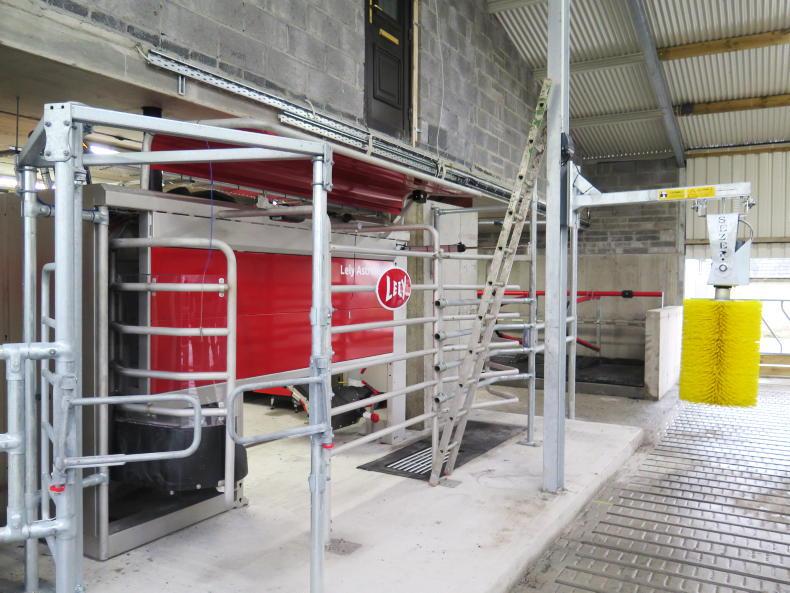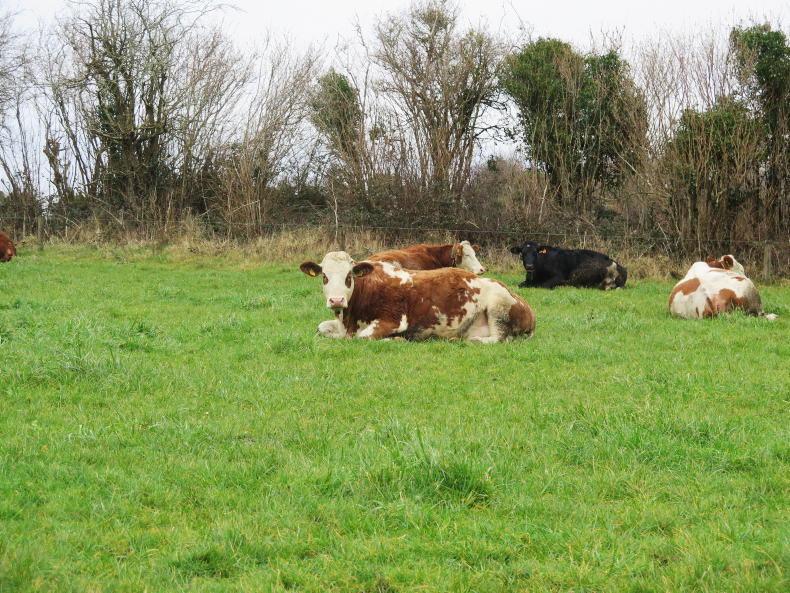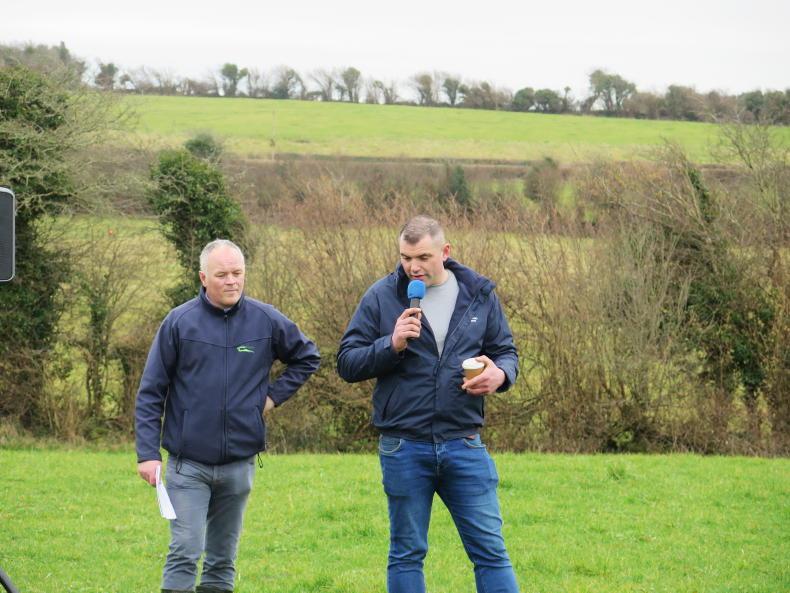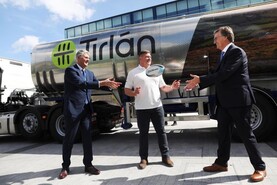Seamus Howard’s farm at Kilnaboy in Co Clare is no ordinary farm. Straddling the Burren National Park, 65% of the 106ha is part of the Burren and, within this, there’s 13ha used for winter grazing.
That leaves 38.5ha in the milking platform – a sizeable block of good-quality, very free-draining and productive land.
He recently held an open day on the farm with Teagasc and the Department of Agriculture.
The Howards have been farming organically since 1985, originally by Seamus’s late father, James, and now by Seamus.
Up to recently, it was a very traditional set-up, milking 16 cows in a four-unit plant alongside keeping sheep and cattle.
The big change over the last 12 months is the decision to specialise in dairy farming , increase cow numbers to 50 and install a robotic milking unit.

New robot on Seamus Howard's organic farm.
Even though cows were always milked on the farm, Seamus has effectively decided to start from scratch with new housing, new milking facilities, new fencing, roadways and even a new herd of cows.
It’s a massive change and a huge investment with €250,000 being spent on concrete and steel and a further €100,000 being spent on purchasing the cows, after the sale of existing animals is taken into account.

New cubicle shed on Seamus Howard's farm.
With just 62 organic dairy farmers in Ireland, the pool from which to purchase organic stock is tiny. A derogation is available but it wasn’t sufficient for Seamus, so he decided to import his cows.
The first batch of 14 organic purebred Fleckvieh cows arrived in January 2021, with 35 to 40 organic three-way-cross cows (Norwegian Red x Holstein Friesian x Montbéliarde) due to come in from Denmark in the next few months.

Some of the Fleckvieh cows imported by Seamus.
The finishing touches to the cubicle shed and new milking area have just been completed.
When everything is up and running, Seamus hopes to be milking 50 cows on the 38.5ha milking platform, which is a stocking rate of 1.3 cows/ha.
One complication is that some of the milking platform is across a public road, so an underpass is necessary for the cows to access this when being milked in the robot. This is estimated to cost €30,000 to install.
The farm supplies 100% grass-fed organic milk to Glenisk and will be 100% spring-calving. Being 100% grass-fed means that everything the cows eat must be derived from grass, ie no meal or grain. A grass nut such as dried and pelleted lucerne, imported from Spain or Italy, can be fed at times of grass shortages. This currently costs around €400/t with a crude protein content of 14% to 16%.
Seamus says his milking platform is a mix of improved and unimproved grasslands. The unimproved fields are those that haven’t been reseeded in memory and are a naturally occurring multispecies sward.
Almost 19% of the milking platform was reseeded last year as the stocking rate was low. Red and white clover was sown alongside different types of grasses such as Italian ryegrass and perennial ryegrass. Only certified organic seeds can be sown, although untreated conventional seeds can be sown with permission.
Soil fertility
Soil fertility is reasonably good. The pH is very high and most fields are at index two for phosphorus and potash.
Speaking at the event, Teagasc organic specialist Joe Kelleher said that the target for organic farmers is to be at index two and that some organic fertilisers such as rock phosphate and sulphate of potash can be applied to organic farms. Seamus uses these products on his low-index fields.
It’s fair to say that the swards across Seamus’s milking platform looked very green and healthy looking for the time of year and despite not having received chemical nitrogen in over 35 years. Seamus says the farm is ideally suited to clover.
“Clover and limestone is like dynamite. The limestone which is very close to the surface here retains the heat and clover loves heat, especially red clover. We aim to get one grazing in spring, cut it twice for silage during the summer and then graze it twice more in the autumn,” he says.
Joe explained that red clover can fix up to 300kg N/ha per year and is high in crude protein. He says that annual yields of up to 20 bales per acre can be achieved with red clover-based organic silage over three or four cuts. However, the P and K offtakes need to be replaced and this is where slurry comes in.
Seamus plans to target the slurry and soiled water from the new dairy facility to silage fields and to follow the cows after grazing.
Seamus is being paid a flat rate of 50c/l for the milk, regardless of constituents. This price doesn’t fluctuate on a month-by-month basis, or even year-by-year basis.
Joe Kelleher said that based on selling 5,000l of milk per cow at 50c/l and variable and fixed costs of 30c/l the common profit should be €50,000 in 2022.
This is before the value of stock sales and substantial supports are included. He said that on the Howard farm, these will amount to approximately €50,000. This is made up of an Organic Farming Scheme payment of €170/ha available for farms up to 70ha, plus BPS, ANC and Burren payments.
From this, Seamus has to take out drawings, repay loans for the substantial investment (€7,600 of capital invested per cow) and pay any tax accruing.
There are five companies processing organic milk in Ireland. These are Arrabawn, Aurivo, Glenisk, The Little Milk Company and The Village Dairy. All bar The Little Milk Company operate in the liquid milk market and while Glenisk allow seasonal calving for their grass-fed range, the majority of its suppliers have to produce milk all year round.

Brendan Dunford speaking about the Burren at the organic farm walk on Seamus Howard's farm.
According to Stephen Blewitt from Aurivo, the organic liquid milk market is growing by 10% per year. However, a lack of supply during winter is a major obstacle to future growth as keeping shelves stocked in winter is already a challenge. It’s a similar story with The Village Dairy. Its managing director Noel Barcoe says they would take more milk if they got it, but it needs to be an all year round supply.
For farmers not willing to supply milk over the winter, The Little Milk Company based in Dungarvan, Co Waterford, makes hard cheese for the Irish and German market.
The company says it is actively seeking new spring-calving suppliers. Milk price is closely guarded but is typically 50c/l flat rate with no top-up or fat and protein and very little fluctuation based on market returns.
Next week More on the markets and opportunities for organic dairy.
Seamus Howard’s farm at Kilnaboy in Co Clare is no ordinary farm. Straddling the Burren National Park, 65% of the 106ha is part of the Burren and, within this, there’s 13ha used for winter grazing.
That leaves 38.5ha in the milking platform – a sizeable block of good-quality, very free-draining and productive land.
He recently held an open day on the farm with Teagasc and the Department of Agriculture.
The Howards have been farming organically since 1985, originally by Seamus’s late father, James, and now by Seamus.
Up to recently, it was a very traditional set-up, milking 16 cows in a four-unit plant alongside keeping sheep and cattle.
The big change over the last 12 months is the decision to specialise in dairy farming , increase cow numbers to 50 and install a robotic milking unit.

New robot on Seamus Howard's organic farm.
Even though cows were always milked on the farm, Seamus has effectively decided to start from scratch with new housing, new milking facilities, new fencing, roadways and even a new herd of cows.
It’s a massive change and a huge investment with €250,000 being spent on concrete and steel and a further €100,000 being spent on purchasing the cows, after the sale of existing animals is taken into account.

New cubicle shed on Seamus Howard's farm.
With just 62 organic dairy farmers in Ireland, the pool from which to purchase organic stock is tiny. A derogation is available but it wasn’t sufficient for Seamus, so he decided to import his cows.
The first batch of 14 organic purebred Fleckvieh cows arrived in January 2021, with 35 to 40 organic three-way-cross cows (Norwegian Red x Holstein Friesian x Montbéliarde) due to come in from Denmark in the next few months.

Some of the Fleckvieh cows imported by Seamus.
The finishing touches to the cubicle shed and new milking area have just been completed.
When everything is up and running, Seamus hopes to be milking 50 cows on the 38.5ha milking platform, which is a stocking rate of 1.3 cows/ha.
One complication is that some of the milking platform is across a public road, so an underpass is necessary for the cows to access this when being milked in the robot. This is estimated to cost €30,000 to install.
The farm supplies 100% grass-fed organic milk to Glenisk and will be 100% spring-calving. Being 100% grass-fed means that everything the cows eat must be derived from grass, ie no meal or grain. A grass nut such as dried and pelleted lucerne, imported from Spain or Italy, can be fed at times of grass shortages. This currently costs around €400/t with a crude protein content of 14% to 16%.
Seamus says his milking platform is a mix of improved and unimproved grasslands. The unimproved fields are those that haven’t been reseeded in memory and are a naturally occurring multispecies sward.
Almost 19% of the milking platform was reseeded last year as the stocking rate was low. Red and white clover was sown alongside different types of grasses such as Italian ryegrass and perennial ryegrass. Only certified organic seeds can be sown, although untreated conventional seeds can be sown with permission.
Soil fertility
Soil fertility is reasonably good. The pH is very high and most fields are at index two for phosphorus and potash.
Speaking at the event, Teagasc organic specialist Joe Kelleher said that the target for organic farmers is to be at index two and that some organic fertilisers such as rock phosphate and sulphate of potash can be applied to organic farms. Seamus uses these products on his low-index fields.
It’s fair to say that the swards across Seamus’s milking platform looked very green and healthy looking for the time of year and despite not having received chemical nitrogen in over 35 years. Seamus says the farm is ideally suited to clover.
“Clover and limestone is like dynamite. The limestone which is very close to the surface here retains the heat and clover loves heat, especially red clover. We aim to get one grazing in spring, cut it twice for silage during the summer and then graze it twice more in the autumn,” he says.
Joe explained that red clover can fix up to 300kg N/ha per year and is high in crude protein. He says that annual yields of up to 20 bales per acre can be achieved with red clover-based organic silage over three or four cuts. However, the P and K offtakes need to be replaced and this is where slurry comes in.
Seamus plans to target the slurry and soiled water from the new dairy facility to silage fields and to follow the cows after grazing.
Seamus is being paid a flat rate of 50c/l for the milk, regardless of constituents. This price doesn’t fluctuate on a month-by-month basis, or even year-by-year basis.
Joe Kelleher said that based on selling 5,000l of milk per cow at 50c/l and variable and fixed costs of 30c/l the common profit should be €50,000 in 2022.
This is before the value of stock sales and substantial supports are included. He said that on the Howard farm, these will amount to approximately €50,000. This is made up of an Organic Farming Scheme payment of €170/ha available for farms up to 70ha, plus BPS, ANC and Burren payments.
From this, Seamus has to take out drawings, repay loans for the substantial investment (€7,600 of capital invested per cow) and pay any tax accruing.
There are five companies processing organic milk in Ireland. These are Arrabawn, Aurivo, Glenisk, The Little Milk Company and The Village Dairy. All bar The Little Milk Company operate in the liquid milk market and while Glenisk allow seasonal calving for their grass-fed range, the majority of its suppliers have to produce milk all year round.

Brendan Dunford speaking about the Burren at the organic farm walk on Seamus Howard's farm.
According to Stephen Blewitt from Aurivo, the organic liquid milk market is growing by 10% per year. However, a lack of supply during winter is a major obstacle to future growth as keeping shelves stocked in winter is already a challenge. It’s a similar story with The Village Dairy. Its managing director Noel Barcoe says they would take more milk if they got it, but it needs to be an all year round supply.
For farmers not willing to supply milk over the winter, The Little Milk Company based in Dungarvan, Co Waterford, makes hard cheese for the Irish and German market.
The company says it is actively seeking new spring-calving suppliers. Milk price is closely guarded but is typically 50c/l flat rate with no top-up or fat and protein and very little fluctuation based on market returns.
Next week More on the markets and opportunities for organic dairy.










 This is a subscriber-only article
This is a subscriber-only article











SHARING OPTIONS: